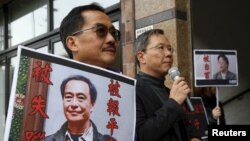Police in the southern Chinese province of Guangdong have confirmed the arrest of three missing Hong Kong booksellers who mainland authorities said are under investigation for "illegal activities."
Analysts said the official confirmation spells bad news for the trio's fate, as it indicates their low level of cooperation in building up a legal case against their employer, Gui Minhai. He allegedly riled Chinese authorities by intending to publish a book about the private life of Chinese President Xi Jinping, including purported love affairs.
In a letter responding to Hong Kong police, mainland authorities stated that Lui Por, Cheung Chi Ping and Lam Wing Kee were suspected of involvement in a case relating to Gui. Hence, "criminal compulsory measures were imposed on them," according to a press statement released by Hong Kong police late Thursday night.
The official explanation came more than three months after the trio's disappearance in late October, without specifying the charges on which they’re being held.
Pressuring Gui
The latest development showed that Chinese authorities are not satisfied with the three men in terms of implicating their boss, said political analyst Willy Lam, a well-connected columnist.
“What the [mainland] police want is some incriminating evidence against Mr. Gui, who was kidnapped in silence in October. So, Gui is the main target of these investigations,” Lam said.
A Swedish national, Gui – owner of the Hong Kong publishing firm Mighty Current – disappeared in Thailand in late October. On January 17, he was shown on state-run CCTV confessing to a drunk-driving accident in 2004 and asking the Swedish embassy to respect his decision to turn himself in.
But Lam argued that the real reason behind Gui’s detention was his close connection with Xi’s rivals within the Communist Party, who were likely the sources behind his yet-to-be-published book. It’s said to detail the unknown life of Xi.
"The Chinese wanted to find out who provided these juicy stories about Xi Jinping’s lovers or other embarrassing facts, perhaps about the business activities of the Xi family and so forth," the Hong Kong-based analyst said.
Apparently, Gui’s three employees haven’t been a big help in identifying Gui’s sources. As a result, the trio may be held for a longer-than-expected time or even given a jail term, Lam speculated.
Another disappearance
The disappearances go beyond Gui and his three employees. Lee Bo, husband of another Mighty Current shareholder, also vanished from a Hong Kong warehouse in late December. Three weeks later, Chinese police confirmed that the British national was in China cooperating with an investigation.
Guangdong police on Thursday presented a letter handwritten by Lee, who said he didn’t need to meet with the Hong Kong police at the moment and would contact Hong Kong authorities if necessary. Lee’s wife confirmed the letter's authenticity.
Nonetheless, Leung Chun-ying, Hong Kong’s chief executive, told reporters on Friday that his administration would continue to seek a meeting with Lee, who appeared to be arrested in Hong Kong.
The former British colony was guaranteed autonomy under the framework of "one country, two systems" after its return to China in 1997.
In early January, Leung claimed that Chinese authorities have no rights to enforce laws in Hong Kong, which is viewed as a blunt violation of the Basic Law.
Leung criticized
Hong Kong pro-democracy lawmaker Albert Ho said he doubted Lee had made his decision freely, lambasting what he said was the chief executive’s failure to safeguard Hong Kong citizens’ basic rights.
"We regret that he has not done [enough] to allay concerns of Hong Kong people," Ho said. Leung "should have liaised directly with the Hong Kong police office or even up to a higher level. I think he has failed his duty."
Ho vowed to take the case to the United Nation’s Human Rights Committee.
Chilling effect
The five booksellers' disappearances have sparked outrage in Hong Kong.
"Don’t ever believe [China’s promise] that nothing change[s] in Hong Kong over the next 50 years," one user of the Weibo social media website wrote in a post Friday.
Another wrote, "The claws are crossed, [the city’s] civilization will experience a regression by 500 years."
The arrests also is likely to have a chilling effect on many of the city's publishers, one observer said.
"Some of them might self-censor out of fear, but some of them are going to worry about their own personal safety, and worry more about the future of Hong Kong," said William Nee, China researcher for the Amnesty International human rights organization.
"So, it really would make sense strategically for the mainland government to resolve this case in a way that is transparent and on international law standards," Nee said.
He urged China to clarify doubts surrounding the five men’s detention and their rightful access to family members and lawyers.




